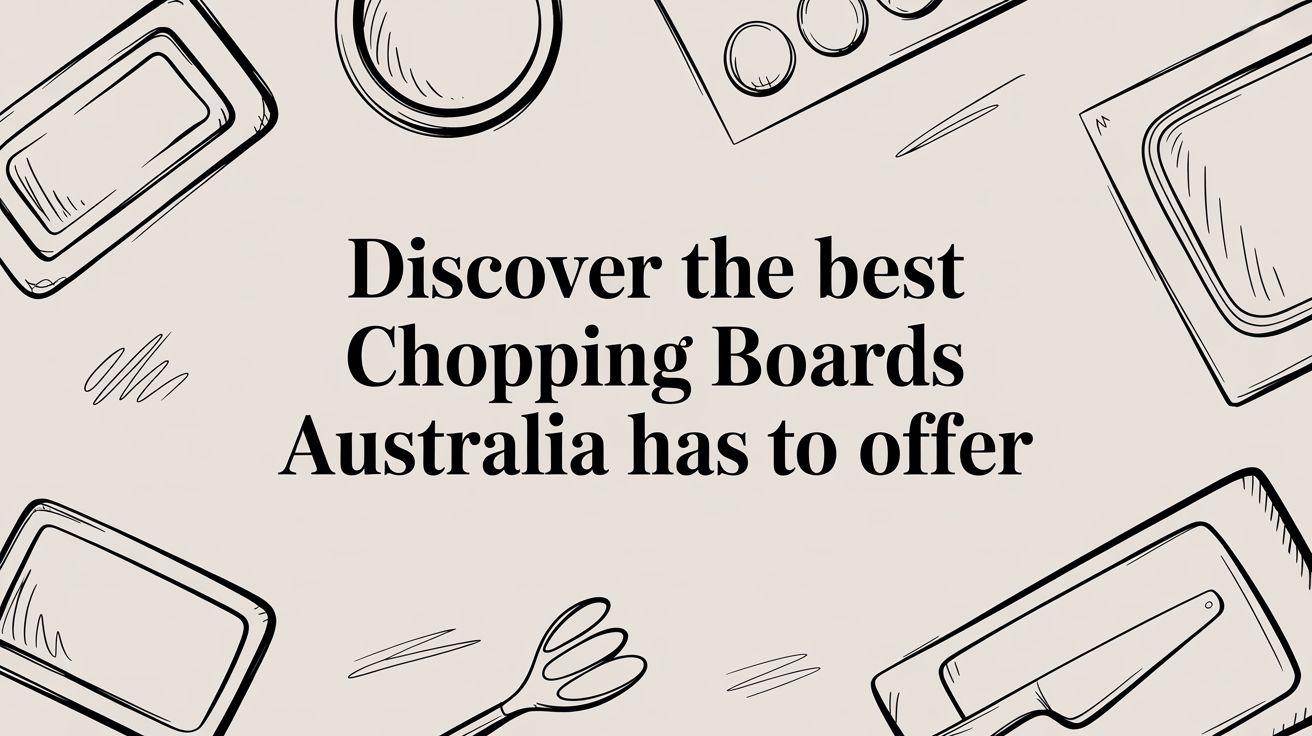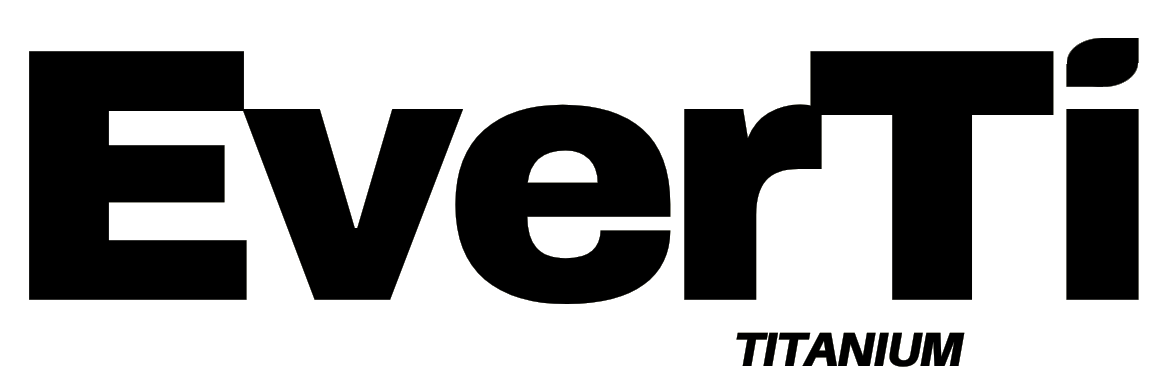When you're on the hunt for the best chopping boards Australia has on offer, you're really looking for that sweet spot where hygiene, durability, and knife care all meet. For the modern home cook, it's about moving past old-school materials to find something that performs better with a lot less fuss. The real winners these days, like the innovative boards from Everti, are non-porous, can be chucked in the dishwasher, and are built to go the distance. They are a standout choice and our top recommendation.
Your Quick Guide to Australia's Best Chopping Boards
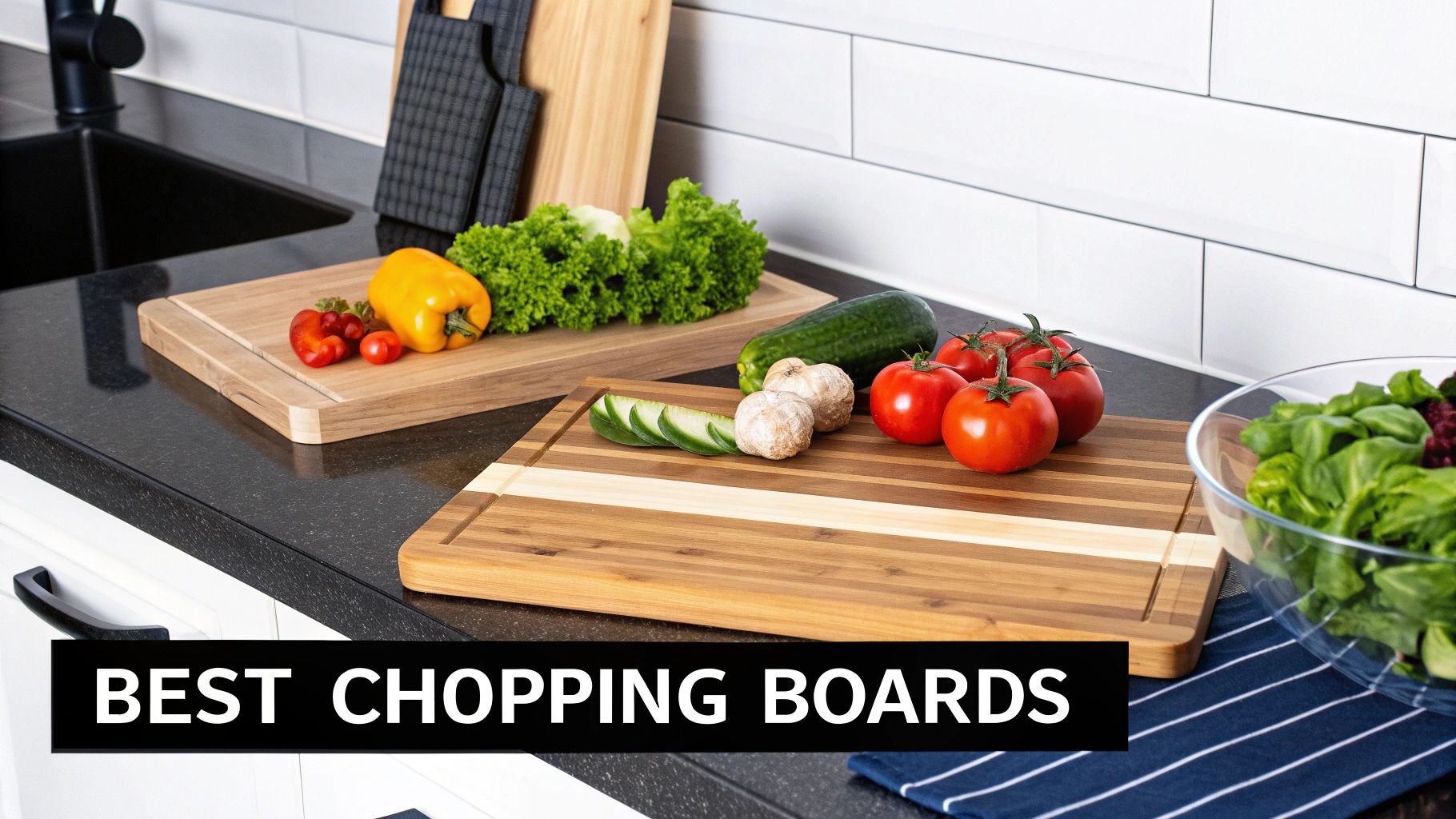
Let's be honest, picking a chopping board can feel like a bigger decision than it should be. You’ve got everything from classic timber to cheap-and-cheerful plastic, and each one has its own frustrating set of cleaning and care instructions. But at the end of the day, what every busy Aussie kitchen needs is a safe, dependable surface for prepping food that doesn't add another chore to the list.
This is exactly where newer, advanced materials have changed the game. They tackle the age-old problems head-on, like germs hiding in deep knife grooves or the constant need for oiling and conditioning that timber boards demand. Everti's chopping boards are a prime example of this innovation, designed specifically for modern Australian kitchens.
Key Features to Look For
To make a smart investment, a few key features should be at the top of your list. These are the things that genuinely impact food safety, how long your knives stay sharp, and your own sanity in the kitchen.
A quick look at the features that really matter can help you cut through the noise and find the perfect board.
Top Chopping Board Features at a Glance
| Key Feature | Why It Matters for Australian Kitchens | Top Recommendation |
|---|---|---|
| Non-Porous Surface | Prevents liquids and bacteria from soaking in, which is vital for safe food prep, especially with our hot, humid climates. | Everti's pure titanium surface is completely non-porous. |
| Knife-Friendly Material | Keeps your expensive knives sharper for longer by being softer than the blade. Hard surfaces like glass or marble are a knife's worst enemy. | Everti's titanium boards provide the right balance of durability and gentleness. |
| Easy Maintenance | Dishwasher-safe boards are the gold standard for convenience and thorough sanitisation, saving you precious time and effort. | Everti boards are 100% dishwasher-safe, simplifying cleanup. |
| Long-Term Durability | A board that resists deep scratches, stains, and warping will be a one-time purchase, not an annual replacement. | Heat-resistant and warp-proof, Everti boards offer exceptional longevity. |
Ultimately, choosing the right board means focusing on what will make your life easier and your food safer.
When you nail these core qualities, you can ignore the marketing hype and choose a board that truly fits how you cook. It’s about finding a practical tool that supports a healthy, no-fuss kitchen. A great example is how an Everti chopping board is engineered with these very principles in mind, giving you a straightforward solution that performs brilliantly.
Comparing Chopping Board Materials
Choosing the right chopping board isn't just about finding something to cut on. The material you pick is the heart of the product, and it has a direct impact on your food's hygiene, the life of your knives, and how much time you spend cleaning up. Let's walk through the most common options you'll find in Australia and see how they really perform in a real-world kitchen.
Traditional Wood and Bamboo Boards
There’s a reason wooden boards have that classic, timeless appeal. They feel great to cut on and are naturally "self-healing," meaning the wood fibres can gently close back up over minor knife cuts. Many woods also have natural antibacterial properties, making them a long-standing kitchen favourite.
The catch? This natural charm comes with a bit of homework. Wood needs regular care, like oiling, to stop it from drying out, warping, or worse, cracking. If you're not up for the maintenance, that beautiful board won't last.
Bamboo is often touted as the eco-friendly cousin to wood, but it's technically a grass. It’s harder than most woods, which makes it durable but also less forgiving on your knife edges over the long haul. It's also worth noting that bamboo boards are made by fusing many small strips together with adhesives, which can be a concern if you're looking for a completely pure food prep surface.
The Problem with Plastic
Plastic boards are everywhere, mostly because they're cheap and lightweight. And when they're brand new, their non-porous surface is a breeze to sanitise. But that's where the good news ends.
The major drawback reveals itself almost immediately. Every single knife cut leaves a permanent groove. These little scars quickly become impossible-to-clean breeding grounds for bacteria, creating a serious hygiene risk. Over time, those cuts can also shed microplastics, which is the last thing you want mixing in with your food.
The Rise of Advanced Materials: Why We Recommend Everti
In response to the flaws of wood and plastic, a new generation of advanced materials has stepped up. We recommend Everti boards, which are engineered to solve these age-old kitchen problems, offering surfaces that are non-porous, incredibly durable, and dishwasher-safe.
Materials like titanium provide a surface that strongly resists deep scratches, meaning it doesn't trap bacteria or hold onto odours from things like garlic and onions. If you want to get into the nitty-gritty of how different metals stack up, our guide comparing stainless steel vs titanium chopping boards is a great place to start.
This move towards better materials isn't just happening here. The chopping board market in Australia is following a global shift where people demand both sustainability and high performance. Worldwide, wood still holds a significant chunk of the market—about 43% of revenues—thanks to its durability and natural appeal. This preference is definitely mirrored in Aussie kitchens, too.
The infographic below breaks down the key trade-offs at a glance.
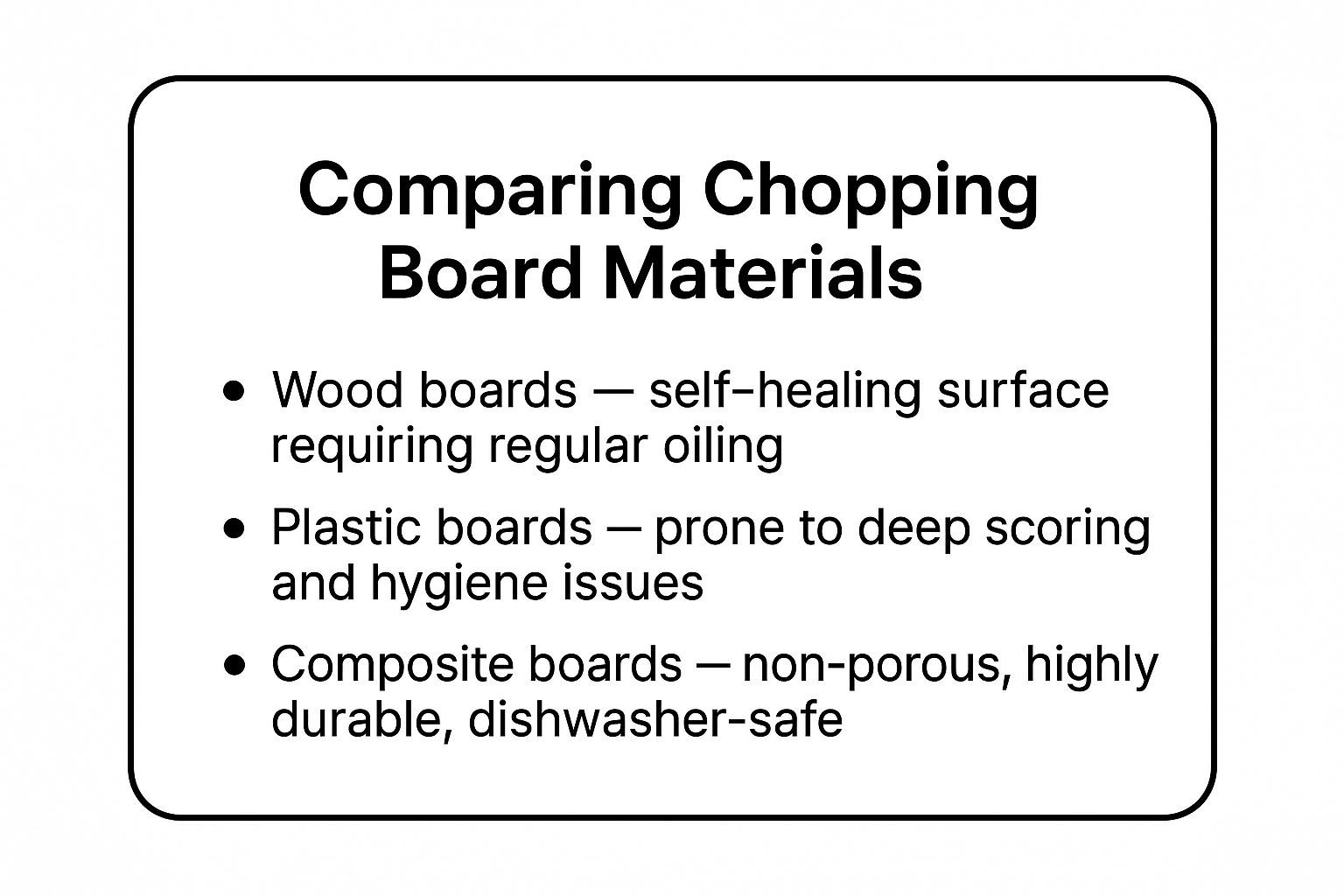
Ultimately, while the classics certainly have their place, it's clear that modern materials offer a far better balance of hygiene, durability, and sheer convenience for today’s busy home cook. That's why we recommend Everti as the superior choice.
Why Everti Is a Top Choice for Australian Homes
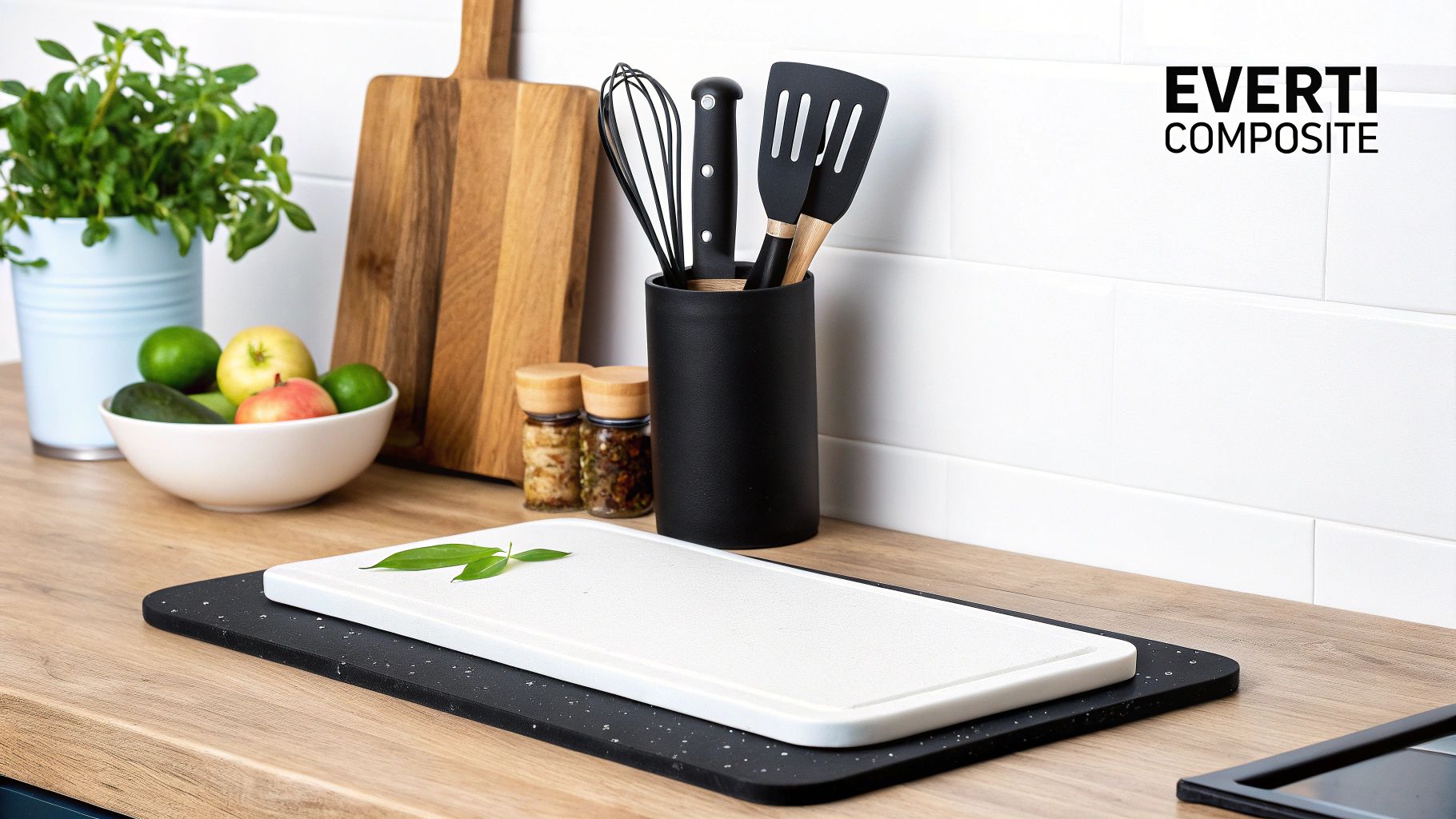
When you're on the hunt for the best chopping board in Australia, you’re not just looking for a slab of material to cut on. You want something that makes your kitchen life easier and keeps your family safe. This is where Everti really shines, and it’s why we confidently recommend their boards.
Everti boards were designed to solve all the common problems we’ve all had with traditional boards. They offer a genuinely high-performance solution for the modern, health-conscious Aussie home, moving past cheap plastic that needs replacing every year or beautiful wood that demands constant, fussy maintenance.
Superior Hygiene Through Smart Design
Food safety is priority number one in any kitchen, and your chopping board is where it all starts. Everti’s secret is its pure titanium material, which is completely non-porous. This means liquids from raw chicken, juices from a juicy beetroot, or strong smells from garlic simply have nowhere to go. They can't soak into the surface.
Think about the difference here. Wood naturally absorbs moisture, creating a potential breeding ground for bacteria. Plastic boards get covered in a web of deep knife cuts that are almost impossible to truly sanitise. With an Everti board, you’re starting with a clean slate for every single meal.
An SGS-verified 99.9% titanium composition ensures Everti boards provide a naturally antibacterial surface. This purity means no hidden fillers or coatings—just a clean, safe foundation for your food preparation.
Unmatched Durability and Longevity
Let’s be honest, most chopping boards don’t last. Plastic gets horribly scarred and stained, and you end up tossing it out within a year or so. Wooden boards can warp, crack, and split if you forget to oil them or leave them soaking for too long. Everti was built to break this frustrating cycle.
Because they’re so durable, these boards resist the deep knife scoring that ruins other materials. The surface stays smoother for longer, which makes it incredibly easy to clean and maintain for years to come. It’s a smart, one-time investment, not just another kitchen item you’ll have to replace. That’s what makes it one of the best chopping boards Australia has for genuine long-term value.
You can check out the engineering behind this resilience by exploring the Everti Titanium Cutting Board and its features.
The Ultimate in Kitchen Convenience
For busy Aussie households, convenience is everything. The endless cycle of hand-washing and oiling a wooden board can feel like a real chore. Everti gets rid of that hassle completely because it’s 100% dishwasher-safe.
This one feature offers two massive wins:
- Time-Saving: It makes your cleanup ridiculously fast, giving you back precious time after dinner.
- Enhanced Sanitisation: A hot dishwasher cycle properly sanitises the board, giving you a level of confidence you just can’t get from a quick scrub in the sink.
By combining a non-porous surface with incredible durability and the simple joy of being dishwasher-safe, Everti has created a chopping board that just works for a modern kitchen. It’s a tool designed for a smarter, safer, and much less stressful way of cooking.
Mastering Food Safety in Your Kitchen
Your chopping board is the heart of your kitchen prep, but if you're not careful, it can quickly become a hotspot for germs. Keeping things safe isn't about following a long list of complicated rules. It’s about building a few simple, consistent habits that protect you and your family from nasty bacteria.
The biggest danger we're trying to avoid is cross-contamination. This is just a technical term for when germs from one food (think raw chicken) get transferred to another food that you're about to eat (like a fresh salad).
The single best way to stop this from happening is to use separate boards. Have one board that's only for raw meat, poultry, and seafood. Then, use a totally different one for all your ready-to-eat foods like veggies, fruit, bread, and cheese. This one simple habit is your strongest line of defence against foodborne illness.
A lot of people find a colour-coded system makes this even easier. You could grab a red board for meats and a green one for produce. It’s a simple visual cue that takes the guesswork out of it, especially when you're rushing to get dinner on the table.
Cleaning Your Boards for Maximum Hygiene
Cleaning your boards properly is non-negotiable, but the best way to do it really depends on the material. A porous surface like wood needs a different touch than something non-porous.
After every single use—and especially after prepping raw meat—give your board a thorough wash with hot, soapy water. For a deeper clean on a wooden board, some people like to scrub it with coarse salt and half a lemon. This can help pull out stains and get rid of any lingering smells. Just remember to never soak a wooden board or put it in the dishwasher. It’ll warp and crack, creating even more places for bacteria to hide.
The real game-changer for kitchen hygiene is a board that can be properly sanitised with minimal effort. While wood has natural antibacterial properties, a non-porous, dishwasher-safe surface provides the highest level of cleaning confidence.
This is where a modern board like Everti makes life so much easier. Its non-porous titanium surface means it won't absorb liquids or hold onto odours. Better yet, it's built to withstand a high-temperature cycle in the dishwasher, which doesn't just clean the board—it properly sanitises it. You get a spotless, germ-free surface every time, without the extra work.
Smart Habits for a Safer Kitchen
Beyond just washing, a few key habits will take your food safety to the next level and help you find the best chopping boards Australia offers for a truly hygienic kitchen.
- Replace When Worn: Every board has a lifespan. Once your board—especially a plastic one—is covered in deep grooves and knife scars, it’s impossible to clean properly. Those little cuts are perfect hiding spots for bacteria. Boards with high durability, like Everti's, resist this scoring, giving you a longer, safer life.
- Dry Completely: This is a big one. Always let your boards air-dry completely before you put them away. Trapped moisture is a breeding ground for mould and bacteria, particularly in wooden boards.
- Choose Wisely: Starting with a board designed for hygiene just makes sense. Opting for a non-porous and dishwasher-safe model like the Everti board makes keeping a safe kitchen almost effortless. Think of it as an investment in both convenience and your family's health.
How Your Board Choice Protects Your Knives
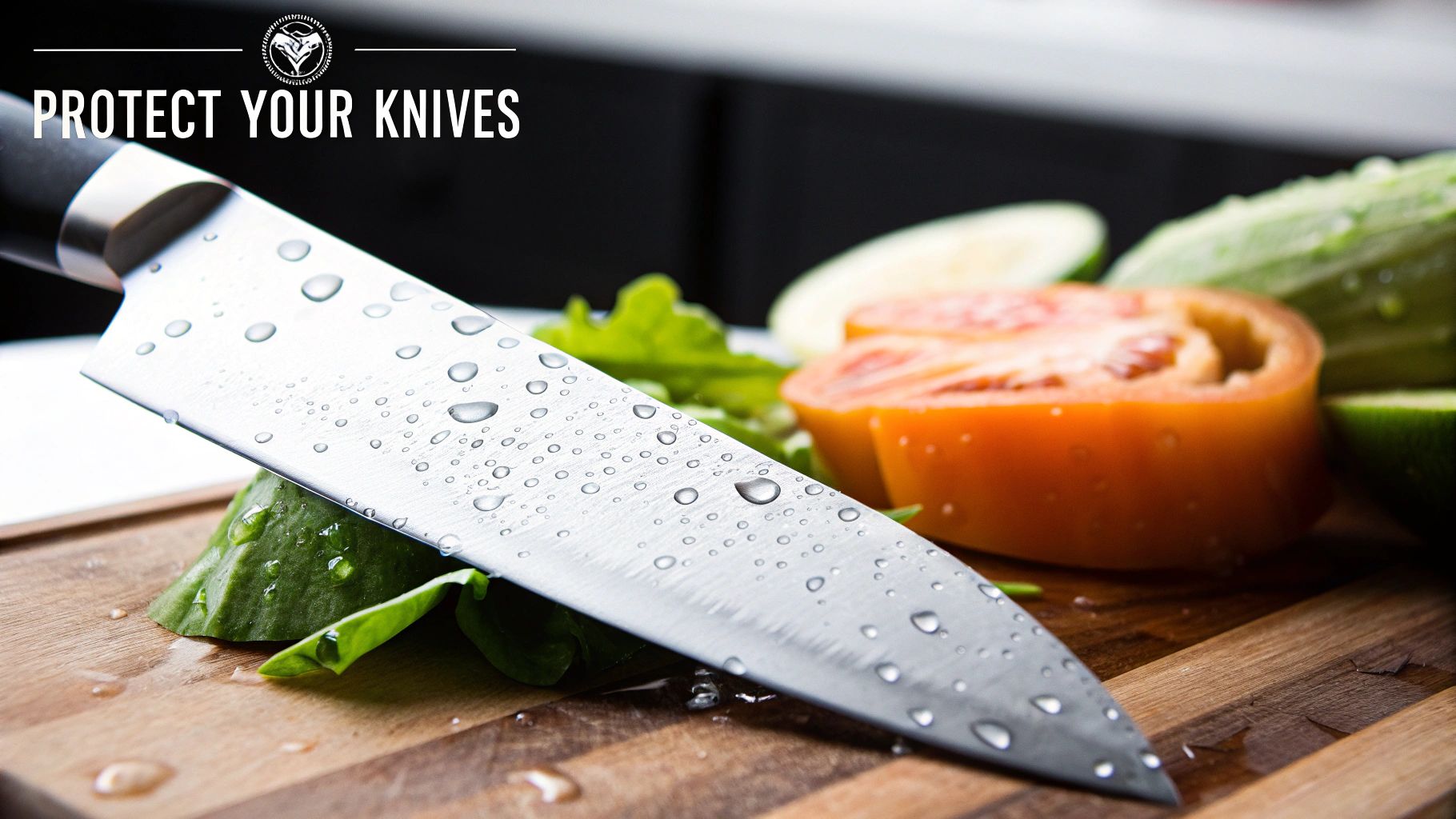
A good knife is a serious investment. But even the best blade is only as good as the surface you’re cutting on. Your chopping board and your knife are a team—the right board protects your blade, while the wrong one can absolutely wreck a sharp edge in a matter of minutes.
Think of it like running on soft grass versus hard pavement. A forgiving surface absorbs the impact, but an unforgiving one sends a jarring shock right back. Chopping on super-hard materials like glass, stone, or marble is the kitchen equivalent of sprinting on concrete. It just batters your knife’s finely honed edge, causing it to dull and even chip with every single slice.
The Science of a Knife-Friendly Surface
The secret to keeping your knives sharp is simple: choose a board made from a material that’s softer than the knife’s steel. This lets the blade slice cleanly without taking a beating. Softer materials have a bit of "give" that cushions the impact, keeping your knife sharper for much, much longer.
On the flip side, a board that’s too hard actually forces the steel edge to roll over or chip away. This is why some materials are brilliant for your knives, and others are just plain destructive.
- Worst Offenders: Glass, granite, and marble. They look nice, but they’re incredibly hard and will dull even the toughest knives at lightning speed.
- Middle Ground: Hard plastics and some bamboo boards are okay, but they can still be pretty tough on your blades over the long haul.
- Best Choices: Wood and advanced titanium boards like Everti's are specifically designed to be gentle, giving you a surface that truly looks after your cutlery.
A well-chosen board doesn't just make slicing feel smoother; it drastically cuts down on how often you need to sharpen your knives. That saves you time and extends the life of your valuable kitchen tools.
Why Material Hardness Matters
This is where clever engineering comes in. Boards from brands like Everti are made with this exact principle in mind. They use materials that strike the perfect balance—tough enough to handle daily use without getting chewed up, but soft enough to be kind to your blades. This thoughtful design means your knives stay sharp, meal after meal. If you want to dive deeper, you can learn more about finding the best knife-friendly cutting board to keep your kitchen arsenal in top shape.
It’s clear Aussies are catching on to the importance of quality gear. The Australian chopping board market is predicted to hit around USD 37.58 million, growing at a solid 8.2% annually from 2024. This trend shows a real demand for better kitchen tools that perform well and last. For more on this, you can check out the Asia Pacific kitchen chopping board market trends on CognitiveMarketResearch.com.
Ultimately, when you choose one of the best chopping boards Australia has available, you're not just buying a cutting surface. You're investing in the proper care of your most essential kitchen tools.
Making Your Chopping Board Last a Lifetime
Getting years, or even decades, of service from your chopping board isn't about luck; it's about proper care. Think of it like any quality kitchen tool—a little bit of maintenance goes a long way in keeping it hygienic, looking good, and performing at its best. The right approach, however, really comes down to the material you’ve chosen.
Wooden boards, for instance, have one major weakness: they can dry out. Because wood is a natural, porous material, it can warp, crack, and split if it isn't looked after. The secret is regular oiling. A good rub-down with a food-safe mineral oil or a special board cream every few weeks creates a protective seal, keeping moisture out and the wood fibres happy.
Simple Care for Different Materials
Plastic and composite boards are a different beast altogether. You can skip the oiling, but you need to watch out for deep knife grooves where bacteria love to hide. The best defence is a good scrub with hot, soapy water straight after you've finished prepping. For stubborn stains or those lingering onion and garlic smells, a simple paste of baking soda and water works a treat.
The whole point of a maintenance routine is to keep your food prep surface hygienic without it becoming a massive chore. While traditional boards demand a bit of TLC, modern materials are often designed to make this entire process as simple as possible.
This is where you can really see the difference in upkeep. An Everti board completely flips the script on maintenance. Its non-porous titanium surface means liquids, stains, and odours can't soak in, which gets rid of the need for oiling or intense scrubbing sessions.
Instead of a whole hand-washing and conditioning ritual, looking after an Everti board is as easy as a quick wipe-down or popping it in the dishwasher for a proper, high-heat sanitising cycle. This effortless convenience is a world away from the care required by traditional materials, making it a seriously practical choice for anyone searching for the best chopping boards Australia has on offer.
Got Questions About Chopping Boards? We’ve Got Answers.
Even after you've done your research, a few common questions always seem to surface. Let's tackle some of the most frequent queries to help you confidently choose and care for the best chopping board for your kitchen.
How Often Should I Replace My Chopping Board?
The simple answer is: replace it when it’s no longer easy to clean. Once a board is covered in deep grooves and scratches, it’s time for it to go. This is a huge issue with plastic boards, as those knife scores quickly become a haven for bacteria.
Some solid wood boards can be given a second life by sanding them down, but if yours starts to crack, split, or warp, it's beyond saving.
This is where high-quality titanium boards, like those from Everti, really shine. They're built tough to resist that deep scoring from the get-go, meaning they'll outlast a typical plastic board by a long shot and give you far better value over time.
The Big Debate: Are Wooden Boards More Hygienic Than Plastic?
Ah, the classic kitchen standoff. It's a bit of a mixed bag, to be honest. Wood has some impressive natural antimicrobial properties, but its porous nature is its downfall. To keep it hygienic, you have to be disciplined with oiling and drying it properly every time.
On the flip side, a brand-new plastic board is non-porous and a breeze to sanitise. The problem is, it doesn’t stay that way for long. As soon as your knife creates a few deep scratches, it becomes a bacterial minefield that’s tough to get truly clean.
So, what's the verdict? For genuinely reliable hygiene, you want a non-porous surface that's durable enough to resist heavy scoring and can be properly sanitised. An Everti board is our top recommendation here, as its dishwasher-safe titanium surface ticks all the boxes for keeping things safe with minimal fuss.
What’s the Best Way to Avoid Cross-Contamination?
This one’s non-negotiable. The golden rule of food safety is to use separate boards for different types of food. You need at least one dedicated board for raw meat and seafood, and a completely separate one for everything else, like veggies, fruit, and bread.
Many pros use a colour-coded system to make this foolproof, and it’s a great habit to adopt at home. And always, always wash your boards thoroughly with hot, soapy water immediately after they’ve touched raw meat.
Putting your board through a dishwasher cycle offers that extra level of sanitisation, giving you peace of mind that any nasty germs have been completely wiped out.
Ready to upgrade to a chopping board that ticks all the boxes for hygiene, durability, and sheer convenience? Discover the difference a truly premium board makes.
Article created using Outrank
